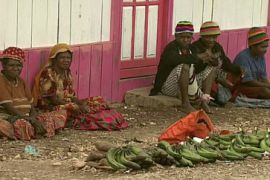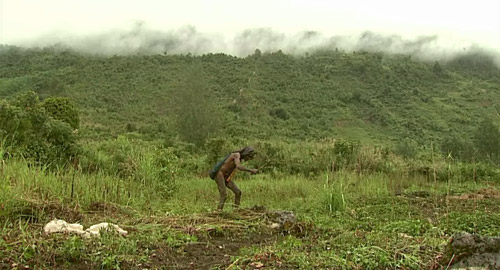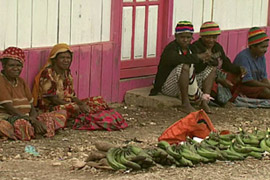Papuan culture under threat
Locals blame immigration and discrimination for slow demise of distinct culture.

 |
| Even in Papua’s remote highlands the culture is not spared from external influence |
The distinct culture of Indonesia‘s Papua province on the western part of the island of New Guinea is slowly disappearing with the increasing arrival of traders from other islands like Sulawesi and Java.
For ages, Papuans have farmed small plots in the highlands, planting potatoes and vegetables – enough to feed the family and make some money.
Although Indonesia has given Papua limited autonomy, many Papuans say they suffer from discrimination and feel their culture is being threatened.
Magda Peke is among those who feel that her tribe’s culture is under threat.
Forced to wear clothes
She told Al Jazeera she is forced to wear clothes if she goes to the market. She only wears the traditional Papuan costume if she is close to her home.
“If we go to the town like this, Indonesian authorities are asking us questions. They ask us who our leaders are,” she said.
“We are afraid that we will not get any help from the government if we use our traditional dress, so we are forced to put government clothes on.
“But before they really can change our culture they have to cut our throat first.”
The indigenous Papuans are unable to compete with the newcomers because they can sell their imported goods at a much lower price.
 |
|
Lack of education, economic means and also |
Yakoba Motte has seen her coconut business collapse over the years.
“Now we are all poor. Before our life was fine but now we can’t earn anything anymore, everyone buys their cheap goods,” she said.
In Enarotali, Papuans sit on the ground selling fresh produce or goods while shops are built behind them.
Not a single Papuan owns a shop in this area, largely due to a lack of education, economic means and also pure discrimination.
There are times when tensions flare up between Papuans and the newcomers, the most recent ending in the detention of about 10 Papuans.
“If Papuans fight among each other the security forces just stand by and watch us kill each other. But when Papuans fight with newcomers the security forces will always take up arms against us,” said an eyewitness who did not want to be identified.
Limited autonomy
Indonesia reportedly banned a US legislator from visiting the province for fear of sparking demonstrations by separatists.
Eni Faleomavaega says he was originally invited by Indonesian officials who wanted to prove their policies in Papua were not violating human rights.
Indonesia has a strong military presence in Papua because of what the government regards as a separatist threat, and there have been accusations of human rights abuses.
However, Agus Sumule, an advisor to the Papua governor, says the situation is improving.
“Of course it is too early to say that the human rights situation in Papua has improved significantly, but I can assure you that the ones who committed violations in the past can’t do that so easily anymore,” he said.
“It’s becoming more open now [with the government], we have a lot of friends from abroad working here now.”
‘Dream of freedom’
Even so, foreign journalists and observers still need a special permit to enter this territory, a sign that Jakarta has yet to take to this new openness.
It’s now up to the government to convince Papuans they are rightful citizens of Indonesia, otherwise they will continue to dream of independence.
For Magda Peke Indonesia will always be a different country.
“I had a dream that Indonesia will one day go back home. Then we will finally be free.”